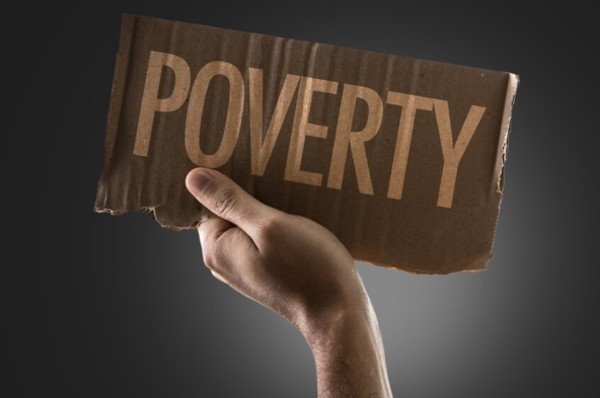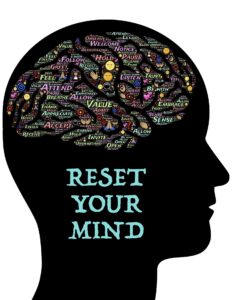How you handle money is more mental than you may think.
Your background, a bad experience you may have had as a child or even as an adult may have caused you financial trauma.
This is one of the reasons why no matter how much you know about money, how many financial courses you take, how many budgets you set up, you just never seem to figure out how to handle your money.
Take my case, for instance, I grew up in poverty and I remember lacking many things so many times.
In my adulthood, I realized that I have to deal with a lot of my poverty and money trauma so that I can be able to break through and actually experience abundance in my personal finances.
There are some sure telltale signs that you may have some financial trauma.
But first…
What Causes Financial Trauma?
Financial trauma comes from years and years of bad experiences with regard to money or even continual stress because of lacking one or more basic needs like food, shelter, clothing, and education.
It can also result from an experience you had after your formative years. E.g you lost money in a particular investment, you were conned, or you lost your job unexpectedly.
These situations can cause a lot of worries, anxiety, and panic which could all contribute to money/financial trauma.
As a child, I remember worrying a lot about things that a child probably shouldn’t have to worry about. I kept wondering if my parents were going to make fees for the next term and whether I was going to be among the people who were sent back home for lack of fees.
It was a constant worry for me.
Now as an adult, I realized how this affected me. When I was about to graduate, I was once again in constant worry about whether I was going to get a job. I even remember saying that I just wanted a job that pays me Ksh 20,000 and I felt like that was a lot.
My experience growing up in lack caused me to have a scarcity mindset. I always felt anxious about money and knew that it is scarce and I’ll never have enough of it.
Even after getting the job which funny enough paid me the exact Ksh 20,000 I had wished for – talk about the power of the tongue- I still worried that I wouldn’t have money the next month or I would lose my job.
I was so scared of losing my job that I couldn’t even apply to other jobs yet I knew I could get a better-paying job elsewhere.
As you’ve seen, the lack mentality and never having enough followed me into my adulthood.
Now when and how did my paradigm shift happen?
I lost my job!
The one thing I was so afraid of happened to me.
I only had savings that could last me a month or two. I didn’t have an emergency fund.
I was super depressed for about 1 month. I didn’t know what to do.
For the 3 years I was employed in an investment company, we’d manage big portfolios. I’d interact with the wealthy and I’d see how they handle their money and most importantly how they think.
I just didn’t think it applied to me.
All this while, I didn’t quite take personal finance seriously. I had opened a Money Market Fund but I was never keen on it.
I wallowed for quite a while, feeling like my life is now over, but it got to a point where I had to figure out what to do now that I didn’t have a source of income.
Since I was working for an investment company, I’d get a lot of people asking me questions about investments.
One day I was in the house doing nothing, then I thought, why don’t I give people money tips on Instagram once or twice every week?
I started by sharing what money market funds are, how treasury bills and bonds work…
I already had the knowledge so it came naturally for me to share.
I did this for fun and to pass time as I applied to other jobs and did a bit of online writing to make money.
On one hand, I’d get regrets and regrets from my job applications but on the other hand, people on Instagram started inquiring if I offered consultations.
I started realizing that there’s actually a business opportunity in this.
I’m privileged to be surrounded by very good mentors. I decided to consult a coach and I was able to see how exactly I can make this a business.
That is how my company The Legacy Hub was born and the journey started.
I, later on, went to therapy to deal with my trauma. Through this, I realized that my money trauma manifested in my hoarding money and limited thinking – I never thought outside the employment box.
I’ve been able to turn around my story by being able to identify my toxic money mindset, how it manifests and learning what I can do about it.
And YOU too can also change your money story.
So, what are some of the signs that you may have money trauma?
Signs That You Have Financial Trauma
- You avoid facing your finances.
If you find yourself running away from dealing with your money situation at all costs, you might have some financial trauma.
You could be knowing for a while that you need to look at your spending or you need to track your spending but you find that you just don’t do it.
Money avoiders will quite literally buy from a supermarket and immediately throw away the receipt so as not to know exactly how much they spent.
This could show that you have some level of anxiety or you feel intimidated just by thinking about your money.
You might know that things are terrible in that area so you avoid facing the reality.
You probably know that you should sit down with a financial advisor/coach or that you need to deal with your debt or even opt out of the many mobile loans.
The bad money habits that you are aware of and you keep saying that you will change but you never actually come to intentionally face and deal with them, could be a sign of financial trauma.
- You overspend and impulse buy excessively
If you find that you spend a lot of money buying things even when you know that you don’t have money, you might be having some money trauma.
In this case, if this person wants a handbag, they will buy a handbag. If they want to go to Dubai, they will take a loan for this. Nothing stops them. If they want to spend, they will spend.
A friend of mine once told me that why she spends like this is to prove to herself and others that she will never go back to poverty.
You’d find someone saying, ‘I never used to have food so I will go to all the restaurants in the world, my mom never used to afford clothes for me so I will have closets full of clothes I don’t wear, I will buy every new phone, I will travel anywhere I want to go.’
It’s as if you are trying to overcompensate for everything you lacked as a child or everything you’ve lacked in your life in the past and now that’s how you’re dealing with the trauma.
Most overspenders and impulse buyers are actually trying to compensate for something.
It could also be a sign that you’re trying to deal with some negative feelings that you don’t want to deal with.
If you keep wondering ‘why did I even do that, why did I buy this, why did I go here knowing I couldn’t afford it but I just couldn’t stop myself’, that’s a sign of financial trauma.
- You underspend money because of a scarcity mindset.
Another sure sign that you have financial trauma is that you underspend or you never spend on yourself and not because you don’t have money it’s actually because you prefer hoarding and you have a scarcity mindset.
Now, this was how my money trauma manifested.
I would literally walk around looking pretty homeless. I would have money to fix my hair but I just wouldn’t do it. My shoe could be falling apart but I would find out a way to rationalize why buying that shoe is wasting money.
Even when my business started doing well, I had money but I still had a very hard time spending and the worst bit of it is I’d see people spend and I’d be entirely offended feeling that these people are wasting money yet I also had a chance to spend the money on myself.
I felt like if I spent on hair, shoes, a trip or even give to charity, I’d have no money left.
If you’re a chronic hoarder, whether you have money or not, and you just have a hard time spending it eventually catches up with you when you’re trying to build your wealth.
Like for me, I had a fear of investing. Investing to me meant losing money. I would rather see my money intact in my bank account or on Mpesa than invest it.
I finally overcame my fear of investing and how I did that was educating myself. This is once I realized that we are afraid of things we don’t understand.
I’m currently making significant amounts of money from my investments.
- You feel extreme discomfort in money matters.
If you find that you get extremely uncomfortable when it comes to discussing money matters, you may have financial trauma.
Have you ever seen people who get completely uncomfortable the moment people start talking about money?
If you want to lose a friendship with that person just bring up a money conversation or ask them how much money they are earning.
Some people would even pull away from social circles just because of money topics.
You need to figure out what exactly you’re so afraid of. Are you afraid that you will be exposed?
For instance, I remember I also had tendencies of a bit of discomfort.
I was embarrassed because I used to feel like everyone just has money except me and that they would find this ‘fact’ out.
Even as a child I remember just being the poorest child in the neighborhood. I would wear hand-me-downs from my neighbors and when someone would see me dressed in these clothes and recognize them, they’d point it out laughing and that would really embarrass me.
As an adult, when money conversations would come up and let’s say we had to contribute for a project, I’d be really uncomfortable thinking that my friends would find out that I am just poor and I’d be exposed.
Most of this was really just in my head because the more I started opening up and I got out of my head I realized that my net worth wasn’t my self-worth and I completely detached myself from it.
I started realizing that a lot of these worries and fears were actually in my head.
If you find yourself very uncomfortable around money conversations, it could be that someone did something to you.
Maybe they exposed some financial information that was used against you or you have a fear of exposure because someone will view you differently once they know your financial situation. That is financial trauma.
Once you deal with your trauma, you’ll actually get to enjoy some benefits.
Some deals and some amazing opportunities I’ve gotten just because I’ve had a money conversation with the right person.
- You have a struggle mentality
What do I mean by this?
I know some people who intentionally put themselves in difficult situations.
For instance, there are people who believe that if they get a loan it will push them to work hard because they have an obligation to pay.
I’ve also asked some people why they put money in a particular chama, group or insurance
policy as opposed to another that has better returns and they can have control of their money. Most of them said that they want to put themselves in an investment form that forces them to contribute.
Imagine locking yourself up in some long-term commitment that may or may not be a very good choice just because you want a situation where you feel compelled to contribute. Or even taking a loan that you don’t necessarily need but your mindset is that if you know you have a loan you know it will keep you up at night and you will work hard to pay up.
If you find yourself thinking this way, it means you’re really not in control of your finances, emotions or your impulses when it comes to financial matters.
It’s very helpful to deal with your traumas and to understand where they’re coming from.
Both extremes are bad. If you overspend chronically to the point you get into debt or if you have so much money but you’re walking around looking homeless those are signs of financial trauma.
If you identified with one or more of these signs, worry not.
There are solutions to help you work around your money trauma.
Ways To Deal With Money Trauma
- Identify and accept your situation.
The very first step to dealing with your trauma is to identify your money trauma and accept it.
It could be as a result of your childhood, a bad marriage, a bad partnership, you could have lost a lot of money for one reason or the other. Whatever caused it, you need to identify it.
It is important that you understand that money is not just about how much you have. It is about what you do with what you have and what you do with money is highly affected by your subconscious mind.
When it comes to money decisions it is affected by your money personality, what you think, and what you believe.
If you think or believe that people who have a lot of money are money launders or they’re doing illegal stuff, that’s your mindset around money.
With that mindset, money will never come to you because you’re not even in a mental or emotional state to be able to step up into your rightful place and do what you need to do to actually get to where you need to be.
- Understand how your money trauma manifests
Once you’ve identified your money trauma and how it came about, you need to start checking your life and how your trauma manifests.
Do you have a scarcity mindset, a fear of losing money, a fear of investing, a fear of exposure?
Your money trauma may manifest in lots of ways.
Once you understand how it manifests, intentionally work on debunking those lies and myths that you’ve been believing.
For me, between the time I left employment in 2019 when I actually started this business that I run today a lot of things have changed.
I never for a single day thought it was possible for me to earn Ksh. 50,000 or Ksh. 100,000. I used to think that is the epitome.
Now I’m charging multiple times that to train and coach people and corporates.
The moment I started working on my money mindset and I started releasing money and accepting that I don’t know and actually exposing myself and interacting with people who know what they’re doing with their money, my mind was opened to a whole new world of
possibilities
The amount of money I’ve been able to make isn’t about my qualifications because I don’t even have that many years of experience, neither am I so old that someone can say ‘oh you know she has 20 years of experience.’
A lot of it has to do with the fact that I’ve been able to really heal the unhealthy money mindsets and beliefs that I had and even beliefs about my ability to make money.
Now I’m able to see money opportunities everywhere because my money mindset is healed.
In places where I’d previously see lack or no opportunity at all I no longer think ‘I can’t afford this’ or ‘I can’t have it.’
My mindset has now changed to how can I get it?
Before I’d hear of how people make passive income or 50k per month and I’d say that I’m not at their level. But the truth of the matter is I could get there if only I changed my mindset.
I have gotten there in less than three years and it’s because of that change of mindset.
Instead of saying I can’t make passive income or I can’t get out of debt or I can’t recover from this trauma ask, how can I do this?
Stop seeing impossibility and start asking different questions like how can I make passive income? How can I generate additional streams of income? How can I get out of debt?
Answering these questions will ideally take you from point a to point b to point c to point d and so on.
- Detach your self-worth from your net worth
One other way you can deal with your money trauma is by detaching your self-worth from your net worth.
Your self-worth is not equal to what is in your bank account.
It really is about who you are as a person and your values.
Even when you are broke don’t hide or lie to people about your financial situation.
Also, create relationships where you can comfortably say that you can’t afford something and not be criticized for it.
Once you find out where the trauma is coming from, commit to actually working on it, either by replacing the wrong mindset with a good mindset, exposing yourself, talking to a therapist, or getting a financial coach.
Eventually, you’ll be able to overcome the money trauma and you’ll have sorted 50% of the biggest reasons why we never achieve financial abundance.
The bottom line is
Money decisions are not made on excel sheets or trackers.
They are made when you’re out with friends, when you’re afraid, when you’re bored, when you’re angry, when you’re happy… That’s when you make most of your decisions.
How your subconscious mind makes financial decisions is very important.
Majority of people know that they should save, that investing is important, that you should get out of debt…
But even with all the head knowledge and the information we have on social media, in books, podcasts, some people never seem to figure out their money matters.
Success when it comes to money is 20% what you know and 80% your behavior around money.








6 Responses
How to get there is the problem in my mind
Thank you Susan. How to heal from the trauma?
such an educative blog
What an amazing blog. I always say whoever will grasp Susan’s teachings is the only one who will benefit! Am 💯 one of them. Bless you Susan for what you do.
Wow. Beautiful article very informative. Maybe you can introduslce me to your therapist..
how understand subconscious mind is a challenge ather wish it was good